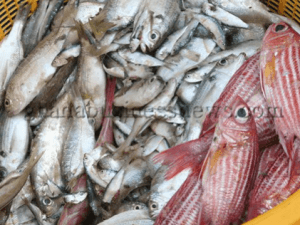Probiotics to help solve aquaculture challenges in Ghana
 Tablets India Limited, (TIL Biosciences) has introduced three probiotic products; Ecotoxnil, Rhodomax, and MFA (Multifunctional Feed Attractant) to help solve disease challenges affecting fish farming in Ghana.
Tablets India Limited, (TIL Biosciences) has introduced three probiotic products; Ecotoxnil, Rhodomax, and MFA (Multifunctional Feed Attractant) to help solve disease challenges affecting fish farming in Ghana.
Probiotics are beneficial bacterium administered through diet, or rearing water to improve fish health and disease resistance, growth performance, and feed utilisation.
The products have won lots of international credentials but yet to be certified by Water Research Institute of the Council for Scientific and Industrial Research (CSIR).
Dr Godfred Ponraj, General Marketing Manager of TIL Biosciences who was in the country for a two day seminar on aquaculture biotechnology said disease had been a major concern in aquaculture, causing about 30 per cent loss in production, and 60 billion dollars to the global industry.
He said probiotics was a long term solution to reducing bacterial load in an era where antibiotics were being banned in aquaculture because fishes were developing resistance to the strains and also affecting water quality.
Dr Ponraj said aquaculture had been plagued with viral, bacterial, and parasitic pathogens, with bacterial pathogens resulting in streptococcus, which was prevalent in Ghana.
Probiotic beneficial bacterium removes pathogenic bacterium and parasites from the gut, and enhances the immunity of its host for better survival and growth.
It also reduces stress and increases general vigour, whiles improving the carcass and flesh quality of fish and shrimp.
Gut probiotics produces organic acids, antimicrobial peptides, enzymes, amino acids and vitamins B, BC, C, and E, and further controls pathogens in faeces.
Soil and water probiotics digest sludge in the pond, minimising black soil and bad odour, while reducing blue-green and red algae.
It maintains fertile pond bottoms by recycling unused feed and organic matter, removes toxic grass from the pond and maintains nutritious water quality.
Overall, it allows for fish farming with less water as pond recycling is reduced, increases water quality, and produces healthy animals with minimal infection.
Dr Ponraj said the products would facilitate organic fish farming, enhance production performance, and conserve nature and the environment.
He said aquaculture investments and returns were high, projected to reach 109 metric tonnes in 2020, and had witnessed a 37 per cent growth rate in 2016, and therefore, advised farmers not to ignore the damages, but rather record losses to be able to manage them.
The seminar was organised by Tablet India and SMAK Systems in Akosombo in the Eastern Region on the theme: Biotechnology a Sustainable Tool for a Healthy Aquaculture Development” and was attended by fish farmers and other players in the industry from across the southern zone of the country.
Mr Emmanuel Aryee, Head of the Inland Fisheries Management Division of the Fisheries Commission, said caged fish farming in particular introduced contaminants to water bodies and affected both fish and water quality.
He said this eventually, posed threats to the health and safety of the nation’s fresh water on which it’s human population depended, therefore, efforts must be made to ensure its sustainability.
Mr Aryee said regulators would be forced to ban fresh water fish farming when it threatened the quality of potable water, and that stakeholders were seeking skill transfers with countries that possessed sustainable solutions.
The Director expressed gratitude to Tablets India and SMAK Systems for the intervention, and said soon after the CSIR had been satisfied with trials, SMAK would be permitted to introduce the products to farmers.
Dr Francis Anani, research scientist at the CSIR’s Water Research Institute at Akosombo said challenges of aquaculture spread across its value chain, causing most fish farmers to fold up.
He noted that feeding held about 70 per cent of fish production costs, and was hopeful that the introduction of probiotics would improve feeding efficiency and drastically reduce costs of production.
Mr Samuel Adrah, Managing Director of SMAK Systems said the products would help provide safer and quality fish at a reduced cost and address the industry’s decline in the past five years.
Source: GNA

Am very much impressed with the idea of ensuring quality water after production.